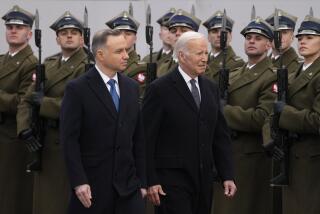U.S. Backs Yugoslav Economic Plan
- Share via
BELGRADE, Yugoslavia — The United States on Tuesday threw solid support behind the economic recovery and reform program of nonaligned communist Yugoslavia, which is struggling with a serious economic crisis.
Deputy Secretary of State John Whitehead, during a Belgrade visit, described the new Yugoslav policies aimed at creating a market-based economy as a dramatic moment in Yugoslav history.
The United States would lend support in assembling a finance package needed for executing the reforms, Whitehead told a news conference.
Last month Yugoslav Prime Minister Branko Mikulic pushed through parliament a package of economic measures aimed at revitalizing the country’s economy, crippled by triple-digit inflation and a $21-billion foreign debt. He freed prices, imports and the currency system while curbing wages, investment and public spending. The reforms were made in connection with a standby credit deal with the International Monetary Fund to pave the way for rescheduling debt.
U.S. Influence
Last week Mikulic presented a sweeping reform proposal to parliament aiming to create a market economy with free prices for goods and labor, a shake-up of ownership regulations and private investment through bonds, stocks and shares.
Yugoslav officials have said the country needs $1.4 billion in fresh credits this year to finance the new economic program and clear the way for Mikulic’s structural reforms.
Whitehead, who is the deputy secretary of state responsible for Eastern Europe, said the United States would use its influence with the IMF, the informal Paris Club of creditor governments and commercial banks to help put the package together.
The United States would also give Yugoslavia $50 million in addition to $500 million being negotiated through the Bank for International Settlements in Basel, Switzerland, and would increase its commodity credits to Yugoslavia, he said.
“The United States is ready to assist in this effort because there’s no question in our minds about Yugoslavia’s importance,” Whitehead said.
“The United States will do everything it can to help Yugoslavia in its effort to develop a successful and free economy. A strong economy will only strengthen Yugoslavia’s position as a model of independence and nonalignment,” he said.
Will Not Renew
He said American businessmen were increasingly interested in joint ventures in Yugoslavia and in expanding bilateral trade, which stood at $1.5 billion last year and is planned to reach $2 billion in 1988.
His pledge of American support came a day after World Bank Vice President Wilfried P. Thalwitz praised Yugoslavia’s reform efforts and promised solid financial backing from that important international lending organization.
Whitehead, asked about U.S. relations with communist Romania, said that the United States did not plan to renew its “most favored nation” trading status so long as Bucharest’s human rights record remained unchanged.
Romania announced in February that it did not wish to renew its MFN status, which expires next month. Romania had enjoyed this trading privilege since 1975 and its cancellation is expected to cost the country $250 million in lost exports.
In February, Whitehead visited Bucharest and said at the time that he was disappointed because he had been unable to convince Romanian President Nicolae Ceausescu of the importance that the United States attached to human rights.
Whitehead said here Romania had voluntarily canceled its U.S. most-favored-nation status in order to avoid U.S. Congressional scrutiny of its human rights record and of its unwillingness to allow free emigration.
More to Read
Get the L.A. Times Politics newsletter
Deeply reported insights into legislation, politics and policy from Sacramento, Washington and beyond. In your inbox twice per week.
You may occasionally receive promotional content from the Los Angeles Times.










